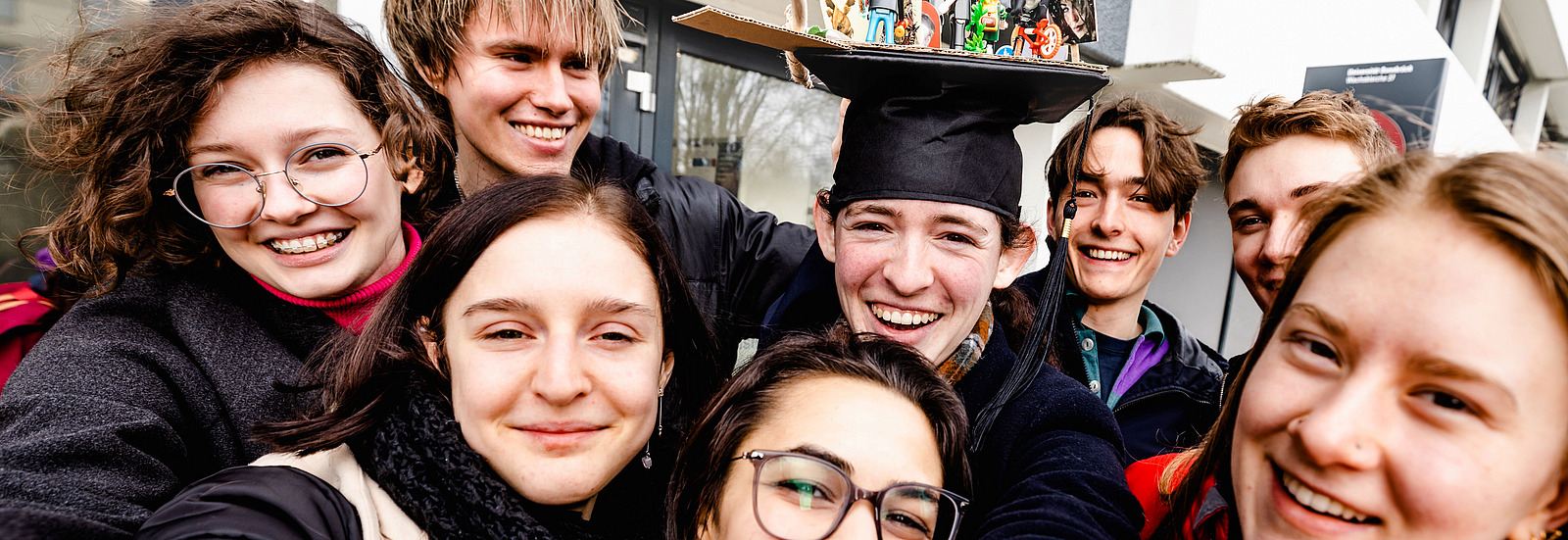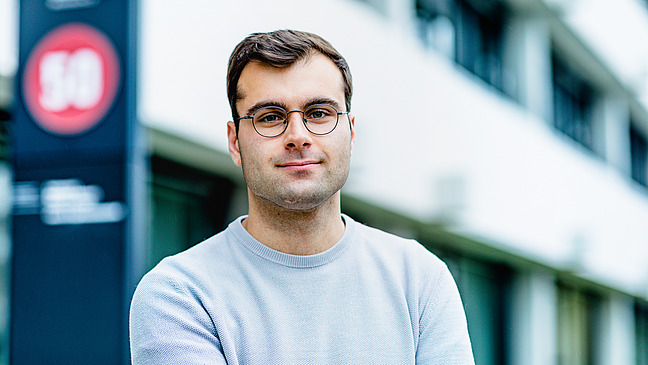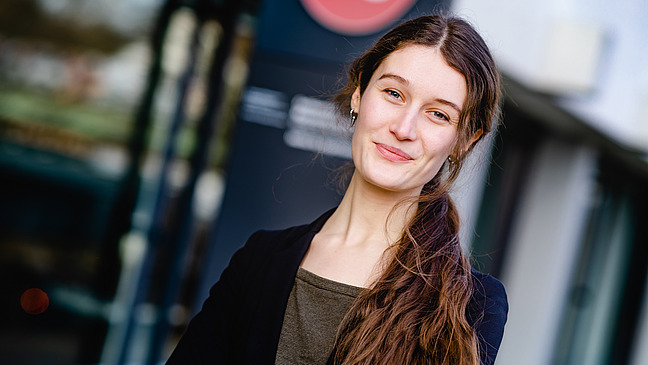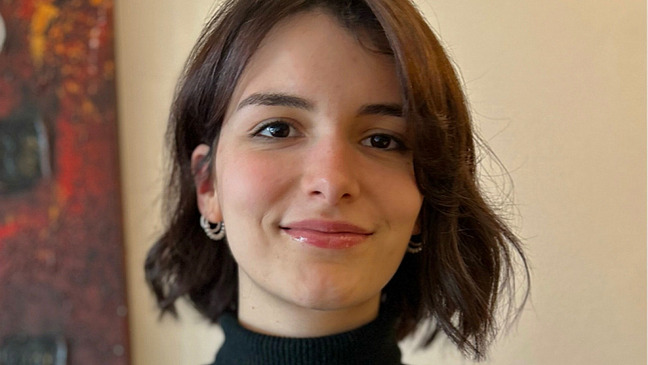PhD in Cognitive Science
Daten und Fakten
Abschluss | PhD in Cognitive Science (alternativ Dr. rer. nat. oder Dr. phil.) |
Regelstudienzeit | 6 Semester |
Studienbeginn | Winter- oder Sommersemester |
Sprache | Englisch, ggf. Deutsch |
Voraussetzung | abgeschlossenes Masterstudium |
Das Promotionsstudium in Cognitive Science vermittelt vertiefte fachliche Kenntnisse und methodische Fähigkeiten, die zur selbständigen wissenschaftlichen Tätigkeit qualifizieren und dient der Ausbildung des wissenschaftlichen Nachwuchses. Für Promovierende wird zu Beginn gemeinsam mit den betreuenden Hochschullehrer:innen ein individuelles Ausbildungsprogramm festgesetzt und im individuellen Entwicklungsplan niedergeschrieben. Neben ihren Forschungstätigkeiten tragen Doktorand:innen zum Teil auch zur Lehre am Institut für Kognitionswissenschaft bei.
Am Anfang des Promotionsvorhabens steht die Suche nach einer bzw. eines Hochschullehrenden, die bzw. der bereit ist, das Promotionsvorhaben zu betreuen, und das Festlegen des Dissertationsthemas. Siehe dazu auch die Seiten der verschiedenen Arbeitsgruppen am Institut für Kognitionswissenschaft, um mögliche Betreuer:innen und Themenfelder auszuloten.
Schaut euch auf der offiziellen Seite zum Thema Promotion innerhalb des Fachbereichs der Humanwissenschaften um ( Promotion: Fachbereich Humanwissenschaften). Hier werden Themen wie Voraussetzungen, Formalitäten, Finanzierung und Ansprechpersonen umfänglich behandelt.
Impressions from our Cognitive Science Ph.D. students
Working group | AG Philosophy of Mind and Cognition | |
PhD Advisor | Prof. Dr. Sven Walter | |
Area of Specialization | Philosophy of Cognition |
I investigate with analytic–philosophical methods how our human cognition could change in the near future due to the ways we are using advanced AI technologies in our daily lives. My goal is to develop and defend a new conception of what this future style of thinking with intelligent tools could look like, and to explain how it differs from other theoretical frameworks that already considered how our cognitive skills depend on external tools and structures. This debate of, as its called, ‘situated cognition’ brought about different hypotheses that I analyze, critique and strive to overcome with my own proposal. This philosophical project consists of theoretically analyzing these proposals, their premises and arguments, and how they are supported or weakened by certain empirical findings from cognitive science overall.
For the flourishing and progressive field of (analytic) philosophy of mind and cognition, it is very important to have a stable footing and exchange with the empirical side of cognitive science. Many traditional and pure philosophy institutes cannot offer this interdisciplinary education and guidance, which could negatively impact my future job chances. However, at the IKW, I’m exclusively surrounded by philosophers and scientists that all have a very diverse educational background and their research interests cover pretty much all cognitive science has to offer. Additionally, I’m also a welcome guest at all regular meetings of the Institute of Philosophy here in Osnabrück, and so I can develop my project with feedback from both academic spheres. And finally, I was fortunate enough to become a scientific coordinator of the DFG-funded Research Training Group ‘Situated Cognition’ which currently encompasses 12 PhDs students who work on both theoretical and empirical projects about very relatable issues. It is this unique mix that determined my decision for pursuing my PhD here in Osnabrück.
Perhaps I am the only scientist at the IKW who was actually born in Osnabrück and then went through the whole academic career (so far) in this exact city, including the bachelor and master in cognitive science at this institute. While this is rather uncommon and perhaps not advisable for an academic career, you may not need to travel the world, if the world travels to you. This is at least the case for the IKW which hosts an extremely international and diverse community of students and scientist such that I never felt like studying just in Germany. In fact, I can write and defend my PhD in English, give my classes in English, and can talk to staff and colleagues as if I am anywhere else in this world. Additionally, I always found the collegial and non-competitive atmosphere beneficial for my personal development and well-being. For example, I was extremely free to define and develop my very own PhD project, choose the courses I want to teach, and decide what important milestones I want to set myself throughout this project. Together with the very low costs of study and living in Osnabrück (especially in international comparison), pursuing my PhD also in Osnabrück at the IKW was a “no-brainer”.
Working group | Machine Learning | |
PhD Advisor | Prof. Dr. Tim C. Kietzmann | |
Area of Specialization | Using machine learning to understand vision and semantics |
My PhD brings together several topics with a common goal: understanding human visual perception by using artificial neural networks (ANNs). Together with my colleagues, I have been exploring biologically plausible models of the topographical organisation of the visual cortex. While ANNs are often used as models for human vision, standard computer vision architectures are very different from the neural organisation in a biological brain. We have developed a new, biologically inspired network that can better capture the development and properties of spatial organisation in the visual cortex. Another project I work on focuses on neural decoding: we use large language models to decode fMRI data of humans viewing images. What ties my work together, is the question of representation - how is information encoded in artificial and biological neural networks, how can we measure their differences and similarities? Ultimately, we aim to bridge the two to better understand human perception.
The main reason I came to the IKW is the Machine Learning research group: both for the topic of research, and for the people. I am fortunate to work in a fantastic group with colleagues who are as excited and curious about research as I am. Their enthusiasm and knowledge inspire me and are one of the main reasons I chose to start a PhD at the IKW. Doing a PhD can be challenging and having supportive and engaged colleagues helps me to learn and grow as a researcher.
I also value being embedded in an interdisciplinary institute with cognitive science as a unified focus. The field I am working in doesn’t always fit neatly into one single academic department. It intersects with machine learning, neuroscience, biology, and even philosophy. Cognitive science as a discipline is formed by this diversity, and having an institute that is actively committing to that, makes the IKW a natural place for my research.
The IKW has built a diverse academic community by supporting interdisciplinary research. It was one of the first institutes to offer cognitive science as a study program in Germany, and has attracted an amazing community of students, who are broadly interested and motivated. I learn a lot from collaborating with them in courses and thesis projects. The international and English-speaking environment at the university has made it easier to set foot in Germany. Even though the city is small, it has a lot to offer beyond academia. The community here makes Osnabrück and the IKW a great place to do a PhD.
Working group | AG Neurobiopsychology | |
PhD Advisor | Prof. Dr. Peter König | |
Area of Specialization | Neurobiopsychology |
My PhD project examines the approach-avoidance bias (AAB), an evolutionarily rooted mechanism that influences how individuals respond to positive or negative stimuli through behavioral, cognitive, and physiological systems. While traditional research has primarily relied on controlled laboratory paradigms with single stimulus presentations, this project aims to clarify inconsistencies in the literature by comparing classic findings with responses observed in more ecologically valid, naturalistic settings. Using a multimodal approach and exploring new methodological setups, this research aims to shed light on how approach and avoidance tendencies operate in everyday decision-making and social interactions, thereby offering deeper insight into the functional role of this bias in real-world human behavior.
I chose IKW because of its exceptional research environment and the unique way it bridges philosophical inquiry with empirical science. The institute is internationally recognized for its high research quality, led by outstanding investigators whose work significantly contributes to the cognitive sciences, particularly in areas aligned with my interests.
What particularly drew me to the IKW is its integrative approach, which does not treat philosophy and empirical research as separate endeavors but weaves them together to form a coherent ontological, epistemological, and methodological foundation for investigating cognition. This rare combination provides a reflective yet rigorous space for scientific inquiry, which is intellectually stimulating and necessary for deepening our understanding of cognition. Moreover, the IKW's pluralistic structure (with multiple research groups exploring diverse topics and methodologies) offers a rich and interdisciplinary environment. This plurality fosters collaboration, innovation, and a broader perspective on complex cognitive phenomena, allowing for a more comprehensive approach to understanding cognition.
Finally, as part of the DFG-funded Research Training Group "Situated Cognition", I’ve had the opportunity to approach my PhD project with a strong emphasis on embodied and situated cognition. Hence, understanding cognition as grounded in bodily and contextual dynamics is central to my project, and the IKW provides both the theoretical grounding and empirical tools necessary to explore these dimensions meaningfully.
What I particularly value about being at the IKW in Osnabrück is the significant contribution it has made to both my personal and academic growth. Moving from South America to Germany has been a significant and challenging step. Being part of such a large, international community has broadened my perspective both culturally and intellectually, while also giving me a sense of belonging. The work environment here is outstanding: supervisors are supportive, peers are highly motivated and collaborative, and there’s a beautiful culture of mutual encouragement. The institute’s plurality and openness also make it a great place for academic networking. The frequent guest lectures, workshops, and conferences offer ongoing opportunities to connect with international researchers and to travel to present our research, something that was much less accessible in my home country. Additionally, I deeply appreciate the possibility to teach and shape my courses. Teaching and supervision are aspects of academia that I'm passionate about, and having the freedom to choose topics that align with my interests is incredibly fulfilling.



